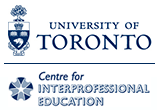We wish to thank the IPE-IPP Summit Steering Committee members for their generous time and commitment in organizing this conference
Sylvia Langlois
Mandy Lowe
Golda Milo-Manson
Johanne Provencal
Jay Rosenfield
Leslie Smith
Maria Tassone
Alisha Tharani
Sarita Verma
We would like to thank all of our sponsor partners for their generous financial support of this event.

The Canadian Interprofessional Health Leadership Collaborative (CIHLC) is a multi-institutional and interprofessional partnership whose goal is to create positive health system change through offering a transformative educational Collaborative Leadership Program grounded in principles of community engagement and social accountability. This project is supported by the Institute of Medicine (IOM) and the Ontario Ministry of Health and Long-Term Care (MOHLTC). The essential outcome of the CIHLC’s work is a new breed of collaborative health leader who can build teamwork across health professionals and health care workers in community, hospital and primary care settings. Ultimately these health leaders will contribute to the larger national and global agenda for economic development and human security.

The Centre for Interprofessional Education (CIPE) is a strategic partnership between the University of Toronto and the Toronto Academic Health Sciences Network with the University Health Network as lead hospital. The Centre provides IPE opportunities to pre-entry to practice students and practice-based health professionals at our affiliated hospitals and community clinical placements and aims to lead the advancement of IPE through education, practice and research initiatives. The CIPE is world reknowned for its innovation in curricular reform and leadership development. Widely published and a leader in knowledge dissemination on IPE, the CIPE is a highly successful extra departmental unit of the University of Toronto.

The Council of Health Sciences (CHS) is the formal body at the University of Toronto that represents the health science sector and facilitates collaboration and enhancement of health science research and education endeavours. An Education Subcommittee with broad membership consisting of key education people in each health science program, coordinates all inter-faculty policy, procedure and innovation across the health programs. Chaired by the Associate Vice-Provost, Health Professions Education, the CHS Education Subcommittee hosts an annual education summit to stimulate and provoke innovation in health professions education.

The Office of Integrated Medical Education (OIME) coordinates integrated medical education (IME) within the full and community-affiliated hospitals, and faculty members and engages with the delivery of medical education across the University of Toronto. Indeed, successful outcomes of integrated education have resulted in excellent performance of the learners and the teachers in the short term, and improved quality of care in community sites in the longer term. The OIME coordinates all community preceptor payments. The OIME hosts an annual education event for medical education and is pleased to partner with the four organizations this year.

The TAHSN Education Committee serves to enhance the partnership between the University of Toronto and its affiliated teaching hospitals through the development of a TAHSN-wide strategy to continuously further excellence in health professional education; through integration of TAHSN / University education activities; through development of integrated polices to advance excellence in education; and through articulation and promotion of a TAHSN / University identity and reputation for educational excellence at the provincial, national and international level. The Committee meets these responsibilities through high level support for innovation and collaboration among partners, sites and programs; through interfacing closely with existing University and TAHSN committees and centres; and through seeking to engage clinical and professional leaders across the health professions.